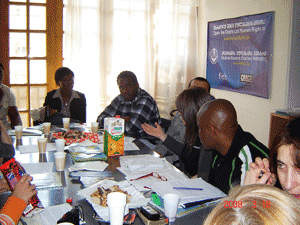 Nona Suvariani, Tbilisi
Nona Suvariani, Tbilisi
Georgia suffer from” Cultural Shock” when they see black people. At least, this what Nigerian youth living in Georgia consider as their first impression of the situation. They complain about Georgian law enforcers who sometimes abuse them.
On March 21 1960 seventy black people were assassinated during the demonstration against Apartheid in Sharpeville, South Africa. Later, 21 March was declared International Day for the Elimination of All Forms of Racial Discrimination by the General Assembly of the United Nations. UNITED for International Action is the European Network against racism, xenophobia and all kind of forms of discrimination.
The Human Rights Center is the member of the UNITED network and it joined together with the Action Week against Racism.
Within the Action Week the Human Rights Center arranged a meeting with representative of the small black community residing in Georgian on March 18-19. On the first day the invited guests met journalists and spoke about their problems and how they faced everyday life in Georgia.
On March 19 representatives of the Human Rights Center initiated the meeting of black youth with the students of the Tbilisi Youth Palace and Georgian-American High School. Racism and all kinds of discrimination were topics for the conversation during the meeting.
Young black people discussed some of the problems that they encounter while living in Tbilisi. All of them arrived as a tourist in Georgia. Then they liked the country and the Georgian people so much so that they even decided to stay here and obtain a higher education. For example, Sylvester Jideophor takes master Degree at the Tbilisi State University; Okoronko Stanley Chidi, Elumelu Patrick Chukwudi and Palinus Nnoso Ajagu study at the Black Sea International University in Tbilisi. All of them run small business in Tbilisi, they have small shops and mostly live in Varketili and Vazisubani districts in the Georgian capital.
It is not strange for Nigerian young people when they see the astonished faces of Georgian people at their sight in the streets of Tbilisi. Sylvester Jydeophor calls it is a “Cultural Shock” and adds that odder generation of the local population are still surprised to see black people when they come in contact. “We cannot say the same about the Georgian youth; we have many friends among them and they do not consider us weird.”
As it became clear the black people do not have perfect conditions in Georgia. They often have incidents because of the color of their skin. They claim that very often they are insulted and abused in the streets. Nelson O Erhunse recalled that once Georgian drunk men started argument with him and his friend near a shop where they wanted to buy something. The men were scolding them; later Nelson decided to call the police but one of the harasser showed him his own ID, which was that of a police officer.
“Most of the time the only time we are harassed is from Georgian law enforcement officers.”
Nino Tlashadze, a representative of the Human Rights Center, said that XXI Century society still is suffers from being racist. People still differ people based on their skin color, social background, religion and ethnic group. That’s why similar activities of face-to-face meetings must be arranged more often.
Organizers of the meeting invited young Arab and Indian students to take part in the meeting; unfortunately, they did not attend the meeting for apparently unknown reasons.



